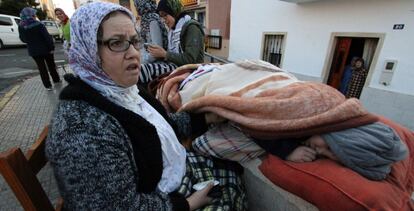Melilla tries to forget the earthquake
Residents recall intense fear they felt as they ran out on to the street in the early hours

Fadma Abdeselam grabbed her nine-year-old son, Aiub, who is epileptic, and “dragged” him out into the street while the house shook. They were still in their pajamas and feeling “really scared.”
“The plates and glasses went crashing to the floor,” recalls the 52-year-old, half a day after a 6.3-magnitude earthquake rocked Melilla in the early hours of Monday morning. “The cupboards kept shaking. It was almost impossible to walk because the movement would hurl you against the walls.”
“It was almost impossible to walk because the movement would hurl you against the walls”
Emergency services reported that 26 people sustained minor injuries as a result of the tremor and around a dozen homes had to be evacuated. A number of streets in this Spanish exclave city surrounded by Moroccan territory were cut off to traffic as a result of the debris that had fallen from buildings. Schools were closed for the day, and residents are still living in fear. Many people spent Monday night out in the open air or slept in their cars, scared that fresh tremors might catch them in their homes again.
“I was sleeping when I felt strong shaking,” says Ibrahim El Funti, 42, who runs a newspaper stand near the port area. “It was so strong that it threw me out of bed.” With hands that are still shaking, he recounts how he ran outside with his wife and two children.
“We were trying to stay calm so my children, who are seven and 10, wouldn’t get scared. But tears were coming out of my eyes as I tried to explain to them what was happening,” recalls Ibrahim.
“But the worst part came later, outside, when we felt the second strong earthquake. We were holding on to a handrail, and first we noticed it vibrating slightly, then very intensely. The thought that it might happen again makes me panic.”
The quake hit at 5.22am, catching most people in bed, and there were 46 aftershocks between then and 6am.
A regular occurrence
The Geological and Mining Institute of Spain notes that the epicenter of the quake is located in a part of the Alboran Sea – the westernmost section of the Mediterranean – that is prone to tremors.
“A significant area of active faults has been recognized in this sector of the Alboran Sea,” explains a spokesperson, recalling two other large quakes registered here in 1994 and 2004. Just last week, there was a 4.9 tremor in the area.
Spanish Prime Minister Mariano Rajoy and King Felipe VI telephoned city leader Juan José Imbroda on Monday to inquire about the effects of the earthquake.
“It’s been a major fright for the people of Melilla, but we hope to be back to normal throughout the day,” said Imbroda, who is asking residents to ignore rumors about further tremors.
Lucía Abad, 24, lives with her parents and sister on a ground floor of Estrella Polar, one of the buildings worst hit by the quake, situated behind the city’s hospital. Passing drivers stop and point at the enormous six-meter crack running along the top of the front wall on this six-story building.
“When I felt the earthquake I wanted to die, because I immediately remembered the one in 2014 [which reached 6.5 on the Richter scale],” says Lucía. “When I got out of bed, I felt dizzy.” She adds that she bumped her head against the wall when she stood up.
Eleven families have been asked to leave their homes because of “structural damage,” said the local government.
Fadma Abdeselam was allowed back into her home at 11am after spending several hours outdoors with her son, who slept under some blankets.
“Now we are thinking about where we will stay tonight. We don’t want to stay here,” she says as her son looks out the window.
English version by Susana Urra.
Tu suscripción se está usando en otro dispositivo
¿Quieres añadir otro usuario a tu suscripción?
Si continúas leyendo en este dispositivo, no se podrá leer en el otro.
FlechaTu suscripción se está usando en otro dispositivo y solo puedes acceder a EL PAÍS desde un dispositivo a la vez.
Si quieres compartir tu cuenta, cambia tu suscripción a la modalidad Premium, así podrás añadir otro usuario. Cada uno accederá con su propia cuenta de email, lo que os permitirá personalizar vuestra experiencia en EL PAÍS.
¿Tienes una suscripción de empresa? Accede aquí para contratar más cuentas.
En el caso de no saber quién está usando tu cuenta, te recomendamos cambiar tu contraseña aquí.
Si decides continuar compartiendo tu cuenta, este mensaje se mostrará en tu dispositivo y en el de la otra persona que está usando tu cuenta de forma indefinida, afectando a tu experiencia de lectura. Puedes consultar aquí los términos y condiciones de la suscripción digital.









































